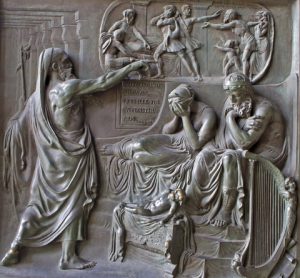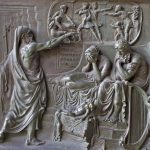How Should We Respond in an Unfair World? 2500 Year-Old Advice…

a lot of unjust rulers
Asaph published Psalm 73 about 2,500 years ago, but it’s still relevant to modern times, with his finger on the injustice that can happen in any society of our fallen world. Narcissistic leaders gorge themselves on their own image (verse 7), boasting of their own wellbeing and oppressing anyone they consider a threat to their power (verses 8, 9), which means everyone. Sound familiar?
Asaph paints a vivid portrait: “Pride is their necklace…an outfit of violence…their eye bulges from fat…they speak as though from on high…abundant waters are slurped up by them (v. 6, 7, 8, 10, LEB). They worship success and seem to always win, enjoying a good life when everyone else has troubles (5), and think of themselves as above the law (v. 5, 8, 12) to which everyone else must submit, and if they believe in God they don’t think he matters (v. 11).
Most of us could make a long list of people we know like this (in politics? Management? Media? Relatives? Church?). And, alas, some of us may admit that sometimes self-centeredness creeps into our own attitudes—e.g., when we expect others to forgive while we justify our own grudges; or strive to protect ourselves from any discomfort while oblivious to the pain of others; or obsess to keep up appearances while neglecting transparency in relationships. Most of us have been there at one point or another.
but that’s not the main point
Hold back a moment before we overdo the application of Asaph’s complaints to our own troubles. Not to sound like a seminary textbook, but to avoid taking anything out of context, we first need to consider Asaph’s overall point. After we know his main purpose we can better understand what he means by the details he includes. In this case, Asaph may have found amusement in waxing eloquent concerning the wicked (haven’t we all?) but complaining about them is not his foremost concern.
his grating question
Asaph has a question grating his soul, as he describes it: “My heart was embittered and I felt stabbed in my kidneys“ (v. 21). (Anyone ever felt stabbed in your kidneys?) If God promised good things to his children, Asaph reasons, then why are the wicked enjoying the goodness instead of us (v. 1-3, 16)? The anguish over his unfair life is so severe it almost makes him turn away from God (v. 2). What is the point, he asks, of remaining innocent from worldly lusts and pleasures (v. 13) if all it gets him is more plagues, oppression and rebuke from the prospering wicked (v. 14)?
the answer: sanctuary

The answer to this question is Asaph’s main point. Verse 17 marks his turn-around: “I went into the sanctuary of God,” he says, “then I understood their fate.” Instead of continuing to struggle and figure it out on his own, Asaph finally turns to the only One who can give him an answer. In the Lord’s presence, Asaph can more clearly see reality through the spectacles of God’s eternal perspective.
In the sanctuary of God’s presence, our questions are refocused through the spectacles of his eternal perspective.
Perhaps his insight came in one wave, perhaps slowly as he worshiped God and gazed on his beauty. Indeed, it’s all worth it—remaining faithful to the Lord and keeping himself innocent from worldly lusts—now that he understands the fate of those who choose to distance themselves from God (v. 17, 27). Their life is like the fleeting image in a dream that disappear upon awakening (20), “how they become a desolation in a moment!” (v. 19).

In the sanctuary, Asaph also comes to realize that there is little difference between the attitude of the wicked and his own bitter complaint that he describes as “brutish and ignorant…like the beasts” (v. 22). How silly to envy worldly pleasures when the Lord “will have hold of my right hand…will guide me with advice and…take me into honor…. God is my reward forever” (v. 23-24, 26), when all things that are apart from God are temporal and fading away. Asaph cries out, “Whom do I have in the heavens except you? And with you I have no other desire on earth” v. (25).
This fallen world reeks of injustice and unfair misery. How do we make sense of it all? “The approach to God is for my good,” Asaph explains. Relationship with God is the goodness that the Lord promised for his people, and it’s all that has lasting value. God is the only reward that will bring eternal satisfaction. As for the arrogant who oppress others, we must keep the faith that God will bring all things to justice in his time.
Since Asaph wrote this, Christ has paid a very high price to resettle the sanctuary of his Spirit in the hearts of all who follow Jesus. We enter that place of intimate communion through the sacrifice of worship, listening prayer, meditating on his word, and transparent fellowship with other believers. In his sanctuary and word we find his wise direction with the strength to walk with confidence in his guidance. He transforms our lifestyle to walk in his mercy that extends to others, “in order to tell of all his works” (v. 28) of peace that defies the injustices and troubles of our fallen world. As we surrender to the inner sanctuary of the Spirit’s presence, we come into alignment with his character, strong and kind, full of grace and wisdom.
I’d love to hear from you! What questions have you struggled with? What are the answers God has given you?
Other Bible verses for study and meditation: Psalm 16:7-11; Romans 8:1-17; 12:1-2; 1 Cor 2:6-16
*Note that all Scripture quotations are from the Lexham English Bible (LEB).


